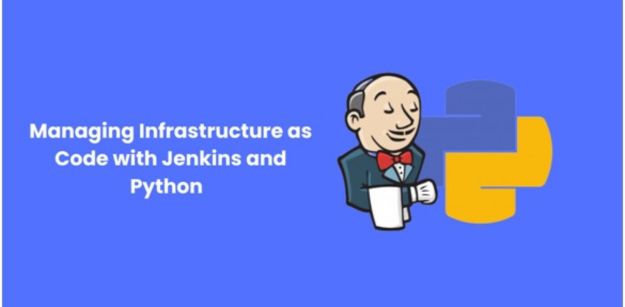Effective infrastructure management is crucial. A revolutionary method for providing and maintaining more automated and predictable infrastructure is called Infrastructure as Code (IaC). A well-known open-source automation server, Jenkins is essential for implementing IaC, especially when paired with Python’s strength and adaptability. We’ll explore how Jenkins and Python work together in this blog article to simplify infrastructure management, focusing on the value of Jenkins Training and Jenkins Python integration.

Table of contents
- The Essence of Infrastructure as Code (IaC)
- Jenkins
- Jenkins Python Integration
- Implementing Jenkins Python IaC
- Conclusion
The Essence of Infrastructure as Code (IaC)
Before delving into Jenkins and Python’s management of IaC, let’s grasp the fundamental ideas of IaC. A paradigm known as IaC considers the supply and control of infrastructure as code. IaC enables you to design your infrastructure using code, frequently in declarative or imperative styles, instead of manually configuring servers and networks. With the same rigour as application code, this code may be rigorously tested, version-controlled, and deployed. It has several benefits, including:
- Reproducibility: IaC allows you to quickly and easily recreate your complete infrastructure, assuring consistent conditions for development, testing, and production.
- Scalability: IaC enables dynamic infrastructure resource scalability, essential in today’s elastic contexts.
- Automation: Automating routine processes may save time and reduce human error, such as server provisioning, configuration management, and application deployment.
- Collaboration: Since infrastructure code is viewed the same as application code in IaC, collaboration between the development and operations teams is encouraged.
Jenkins
Jenkins is a commonly used automation server that excels at coordinating and automating processes throughout software development and IT operations. It is the ideal option for controlling infrastructure as code since it provides various plugins and connectors.
Jenkins Training: Jenkins training must be financed if its full promise is to be realised. It is essential to comprehend its capabilities, the plugin ecosystem, and recommended practises to manage infrastructure as code effectively. You can efficiently set up, configure, and maintain Jenkins pipelines with the help of Jenkins training.
Jenkins Python Integration
Python is a fantastic language for developing code to manage infrastructure because of its simplicity, readability, and large library of tools. Because Jenkins is adaptable and expandable, you can easily incorporate Python scripts and libraries into Jenkins workflows. Here’s how Jenkins and Python working together can revolutionise IaC:
- Python scripts may build bespoke automation and logic inside Jenkins processes. For instance, based on particular project needs, Python scripts may be written to dynamically build infrastructure configuration files.
- Regarding their infrastructure requirements, many businesses employ cloud services like AWS, Azure, or GCP. Jenkins pipelines can easily include Python’s powerful libraries for interfacing with cloud APIs, enabling the automated provisioning and control of cloud resources.
- Python is a great option for testing infrastructure programming because of its comprehensive testing frameworks. You may guarantee the dependability and stability of your infrastructure by adding Python testing into Jenkins processes.
- Data from your infrastructure may be gathered and analysed using Python’s data processing capabilities. Jenkins may run Python scripts to create reports, check the system’s health, and provide notifications when problems occur.
- Python may be useful in CI/CD pipelines, which Jenkins is excellent at automating. Python scripts may be used for things like orchestrating deployments, screening for vulnerabilities, and checking the quality of your work.
Implementing Jenkins Python IaC
Below are the process of implementing Jenkins Python IaC:
- Set Up Jenkins: Installing and configuring Jenkins on your desired infrastructure should be your first step. You have various installation choices, including dedicated servers, virtual machines, and Docker containers. To ensure a successful setup, ensure you have Jenkins training or access to resources with administrative experience.
- Install Plugins: Several plugins are available for Jenkins, including ones for integrating Python. Install the required plugins to allow Jenkins pipelines to run Python scripts. Two well-known plugins are “Pipeline” and “Python Plugin.”
- Define Jenkins Pipelines: The Groovy programming language, which is domain-specific, is used to construct Jenkins pipelines. There are phases for developing, testing, and deploying infrastructure code that may be included in pipeline scripts. As necessary, incorporate Python programmes into these steps.
- Version Control: Infrastructure code should be version-controlled, much like application code. Utilise a version control system, such as Git, to manage the codebase for your infrastructure. Jenkins has the ability to automatically fetch the most recent code, guaranteeing that your infrastructure is always current.
- Automate Testing: Use Python frameworks like pytest or unittest to create automated tests. To verify the accuracy of your infrastructure code, Jenkins may run these tests as part of your pipeline.
- Organise Deployments: To manage the deployment of your infrastructure modifications, use Python scripts. Python is a useful tool because of its adaptability, whether you’re managing network resources, setting up containers, or deploying virtual machines.
- Monitoring and Reporting: Use Python scripts to monitor your infrastructure’s performance and health. Configure Jenkins’ alerts and notifications to react to problems as soon as they arise.
- Continuous Improvement: By routinely examining and improving your Jenkins Python IaC pipelines, you may adopt a culture of continuous improvement. Monitor pipeline performance, spot bottlenecks, and make incremental improvements.
Conclusion
Jenkins and Python work together to provide a strong and adaptable solution. You can take your infrastructure management to a new level of effectiveness and dependability by investing in Jenkins training and becoming an expert at integrating Jenkins Python scripts. Jenkins and Python enable businesses to adapt to the needs of contemporary, agile software development and IT operations. These tools enable organisations to customise, automate, and orchestrate infrastructure functions. Don’t let this dynamic pair’s enormous potential pass you by; start learning about Infrastructure as Code with Jenkins and Python immediately.